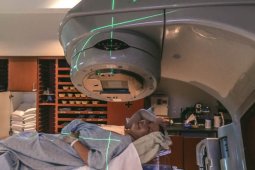Radiation Therapy for Breast Cancer and types of Radiation Therapy
Apr 19, 2022
Some women with breast cancer will need radiation, often in addition to other treatment modalities. The need for radiation depends on what type of surgery is done, whether cancer has spread to the lymph nodes or somewhere else in the body. Tumors that are large or involve the skin might also need radiation.
Radiation therapy (also called radiotherapy) uses high energy rays from X-rays, protons or other sources to kill cancer cells. Rapidly growing cells, such as cancer cells, are more susceptible to the effects of radiation therapy than are normal cells.

Types of Radiation Therapy for Breast Cancer
Two main kinds of radiation therapy for breast cancer:
- External radiation-most common type of radiation, typically given after lumpectomy and mastectomy
- Internal Radiation (brachytherapy) – less common method of giving radiation. It is given after a lumpectomy.
- Intraoperative radiation
Radiotherapy is now commonly used in conjunction with breast conservation as part of the primary treatment. Radiotherapy is commonly delivered to the entire breast with a boost of therapy to the tumor bed using external beam therapy. Recently, shorter courses of external beam radiation may be considered for treating the breast only.
Partial breast irradiation may be delivered by brachytherapy or focused external beam treatment.
Radiation Therapy in case of Breast Removal Surgery: Mastectomy
Radiotherapy may be employed following mastectomy in women who have a particularly high likelihood of local recurrence. When the risk of local recurrence is high, radiation therapy is associated with improved overall survival. Postmastectomy radiation is indicated if the primary tumor is larger than 5 cm or if four or more positive lymph nodes were found in the axilla.
Although, there is a potential benefit on survival in lower-risk patients, such as those with one to three positive axillary lymph nodes.
Following breast conservation, radiation may be omitted in patients older than 70 years of age with estrogen receptor-positive tumors smaller than 2 cm if they are treated with anti-estrogen therapy.
Radiation therapy is generally administered after completion of cytotoxic therapy (when indicated). Radiation therapy is also helpful as an adjunctive therapy for the metastatic or locally advanced and unresectable disease. Local recurrence and isolated or specific (painful bone lesions particularly with impending fracture) distant metastases also are frequently treated with radiotherapy.
What are the Side Effects of Radiation?
Radiation therapy can have side effects, and these vary from person to person.
The most common side-effects are:
- Sunburn-type skin irritation of the targeted area (which may range from mild to intense)
- Red, dry, tender, or itchy skin
- Breast heaviness
- Discoloration, redness, or a bruised appearance
- General fatigue
Myths about radiation therapy
- Radiation therapy is painful-Not really.
- Radiation therapy will cause loss of hair-No, Not on the head, anyway.
- Radiation therapy will cause nausea and vomiting-Not usually.
- Radiation therapy will increase the chance of getting more breast cancer-No.








